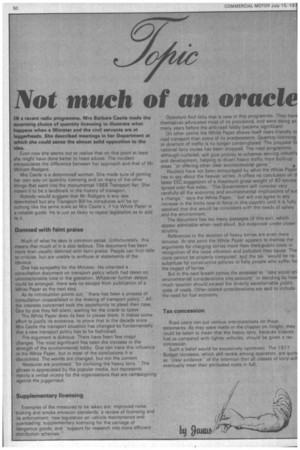ot much of an oracle
Page 52

If you've noticed an error in this article please click here to report it so we can fix it.
N a recent radio programme, Mrs Barbara Castle made the rprising choice of quantity licensing to illustrate what ppens when a Minister and the civil servants are at gerheads. She described meetings in her Department at ich she could sense the almost solid opposition to the ea.
Even now she seems not to realise that on this point at least might have done better to heed advice. The incident capsulates the difference between her approach and that of Mr 'lliarn Rodgers.
Mrs Castle is a determined' woman. She made sure of getting er own way on quantity licensing and on many of the other ings that went into the monumental 1968 Transport Act. She cant it to be a landmark in the history of transport Nobody would suggest that Mr Rodgers is any less ermined but any Transport Bill he introduces will be on o hing like the same scale as Mrs Castle's, if his White Paper :s reliable guide He is just as likely to repeal legislation as to add
mned with faint praise
Much of what he says is common sense. Unfortunately this ans that much of it is also tedious. The document has been ore than usually damned with faint praise People can find little criticise. but are unable to enthuse at statements of the bvio us.
One has sympathy for the Minister fie inherited a sultation document on transport policy which had taken on . conscionable time in the gestation. Whatever further delays uld he arranged. there was no escape from publication of a hite Paper as the next step.
As its introduction points out "there has been a process of nsultation unparalleled in the making of transport policy " All e interests concerned took the opportunity to plead their case. e by one they fell silent, waiting for the oracle to speak The White Paper does its best to please them. It makes some ffort to justify its existence, to prove that in the decade since rs Castle the transport situation has changed so fundamentaliy. at a new transport policy has to be fashioned.
The argument is dubious. There have been few major anges. The most significant has been the increase in the ength of the environmental lobby. One can trace this influence the White Paper, but in most of the conclusions it is iscounted. The worlds are changed, but not the content Measures are promised for civilising the heavy lorry." The rase is appreciated by the popular media, but represents airily a verbal victory for the organisations that are campaigning gainst the juggernaut.
upplementary licensing
Examples of the measures to be taker) are: improved noise. raking and smoke emission standards; a review of licensing and enforcement; new legislation on vehicle maintenance and verloacling, supplementary licensing for the carriage of ngerous goods, and 'support for research into more efficient stribution schemes
Opn_d'iu Iiid little that is new in this programme. They have theMSE,ko:;:, cldvC,Cated most of its provisions, and were doing so n-Iariy years bef(“e the anti-road lobby became significant. On or points the White Paper shows itself ni:6re friendly to road transpcirt ti,an some of its predecessor5„. Quantity ,licensing or direction of traffic is nc) longer coritempiatedi•The prbposal'fci national lorry routes has been dropped. The road programme, although curtailed, will give priority to schemes serving industry and development, helping to divert heavy traffic from built-up" "areas 'or offering other clear erivironmental gains. A Hauliers have, not beeri encouraged by what the 1/Vh4e Paper has to say about the heavier iorries. It oilers no conclusion on .di latest EEC suggestion of a maximum gross weight of 40 tonne Spread over five axles: The Government will consider very carefully all the economic and environmental implications of sum a change. ' says the White Paper, ''but will not agree to any increase in the limits now in force in this country until it is fully satisfied that this would be consistent with the needs of safety and the environment.'' The document has too many passages of this sort, which appear admirable when read aloud, but evaporate under closer scrutiny.
References to the taxation of heavy lorries are even more tenuous. At one point the White Paper appears to dismiss the arguments for charging lorries more than their public costs in recognition of the noise vibration and pollution they Cause. The costs cannot be properly computed, and the tax -would be no substitute for constructive policies to help people who suffer fro the impact of lorries."' But in the next breath comes the proposal to -take social an environmental considerations into accountin deciding by boys/ much taxation should exceed the directly ascertainable public costs of roads. Other related considerations are said to include the need for fuel economy.
Tax concession
Road users ran put various interpretation on these statements As they were made in the chapter on frr-ight, they could be taken to mean that the heavy lorry, because it saves fuel as compared with fighter vehicles, should be given a tax concession.
Such a belief would be excessively optimistic The 1977 Budget increases, which still rankle among operators, are quoti as -elear evidenceof the intention that all classes of lorry will eventually meet their attributed costs in full.




























































































